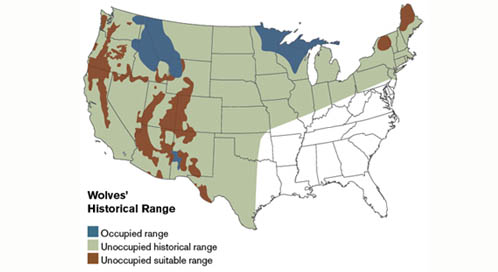Coming to Light
“Over the past decade, millions of animals have met a grim fate at the hands of a ‘hit-man-for- hire’ arm of the U.S. Department of Agriculture (USDA), which gets away with operating like a private contractor while taxpayers like you and me foot the bill,” says Charlotte Conley, a Defenders’ conservation associate.
She is referring to Wildlife Services, a little-known agency within the USDA whose targets include wolves, mountain lions, coyotes, prairie dogs, beavers, foxes and some unintentional victims too, like kit foxes, river otters, pronghorn, golden eagles, wolverines and even family pets. But a federal audit, pushed for by Defenders because of the agency’s lack of transparency, may soon shed some light on whether these lethal—and often brutal—control activities are justified in terms of cost and effectiveness. “There is plenty of evidence suggesting lethal control of our native wildlife is not the most effective solution,” says Conley. “Yet Wildlife Services has never had to justify their methods or even prove it tried nonlethal management first.”
Right Decision
Slow-speed zones for ships navigating key areas for the critically endangered North Atlantic right whale became permanent in December.
Ship strikes are a leading cause of death for whales in the heavily trafficked Eastern Seaboard. “Defenders fought hard for this positive step forward,” says Jamie Rappaport Clark, Defenders’ president. “Now we need the National Marine Fisheries Service to address the problem of fishing gear entanglement.”
The Truth Is Out There
 For wolves, this could be a game-changer: A panel of independent scientists unanimously confirmed in February that the U.S. Fish and Wildlife Service’s (FWS) proposal to remove federal protections for wolves was not based on the “best available science,” as mandated by the Endangered Species Act.
For wolves, this could be a game-changer: A panel of independent scientists unanimously confirmed in February that the U.S. Fish and Wildlife Service’s (FWS) proposal to remove federal protections for wolves was not based on the “best available science,” as mandated by the Endangered Species Act.
“This is what Defenders has been saying all along,” says Jamie Rappaport Clark, Defenders’ president. “There are serious, scientific problems behind the premature move to delist, and Interior Secretary Sally Jewell needs to withdraw this proposal.” Last year, FWS proposed removing almost all gray wolves from protection. But in some states, such as Oregon and Washington, wolf recovery has only begun. In other states, such as California and Colorado, it would make it unlikely that wolves would be able to return even though suitable habitat exists. In 2011, FWS lifted wolf protection in six states, where hunting now occurs at what many fear are unsustainable rates. “If this peer-review process tells us anything, it’s that FWS is not treating wolf recovery the same as it treated the recovery of the bald eagle, peregrine falcon and the American alligator,” says Clark. “These species all reached recovery throughout their range before ESA protections were removed.”




